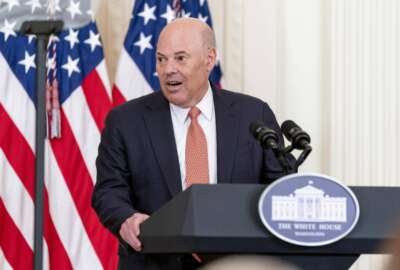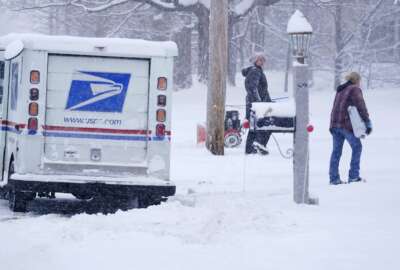USPS sets higher salary caps for management-level employees in 2024
The United Postmasters and Managers Association and National Association of Postal Supervisors agreed to new salary ranges proposed by USPS.
The Postal Service is setting higher caps for its managers, supervisors and postmasters in the new year.
The United Postmasters and Managers Association (UPMA) recently agreed to new salary ranges proposed by USPS. The agreement also applies to members of the National Association of Postal Supervisors.
Under the agreement, USPS will increase the top range of Executive Administrative Schedule (EAS) salaries by 4.7%. USPS will also increase the minimum salaries for each pay band will also increase.
UPMA President Edmund Carley said in an interview that members will see about a 5% average pay increase.
The increases will be applied on Jan. 13, 2024, immediately prior to applying the fiscal year 2023 Pay-for-Performance (PFP) awards.
“It’s a bell curve,” Carley said, “[There’s] very few people in 10, hardly anybody in one or two. Most people are in four, or five, or six, and that I’d say the average is five, which is 5% this year.”
Carley said the pay increase will help USPS retain managers and postmasters earlier in their careers, meant to fill the ranks of “mass retirements.”
“With mass retirements, some people moved up very quickly and had not made the steps as they move up,” Carley said. “It could be a nice little pay bump for some of those people that maybe were lagging behind a little bit.”
Carley said USPS is seeing a wave of retirements among its management ranks, because the agency tends to hire managers and supervisors in waves, and that the senior-most tier of management is nearing retirement age.
“That’s the major factor — they’re all eligible,” Carley said.
Carley said USPS still faces staffing shortages and retention challenges at all levels that worsened at the height of the pandemic, but persist to this day.
“It’s not as fun a job as it might have been in the past,” Carley said. “There used to be times when, if you’re a postmaster, we had to pry the post office for their cold, dead hands. It seemed like they didn’t want to leave. And now, as soon as they’re eligible, they’re gone. We’re seeing a lot more of that,” Carley said.
UPMA added about 8,000 new members since November 2021, but also saw about 3,000 of its members retire during the same period.
“We’re moving the needle, but it’s an uphill struggle. It’s against the wind,” Carley said.
The USPS agreement also allows career non-bargaining employees to carry over an additional 80 hours each leave year by increasing the carryover maximum to 640 hours permanently.
Carley said USPS agreed to keep the leave carryover policy in place, as a holdover from a policy that was put in place at the start of the COVID-19 pandemic.
The policy, he added, sets up postmasters and USPS managers at the end of their careers for a considerable payout of their accrued leave time once they retire.
USPS is also putting an end date to a COVID-era policy that would allow non-bargaining employees to be eligible for additional pay when those employees are needed to deliver mail, due to staffing shortages.
The temporary policy, which began on Dec. 31, 2022, is now set to expire on May 3, 2024. USPS, however, has extended the temporary policy several times already.
Carley said that before the COVID-19 pandemic, postmasters and USPS managers rarely had to delivery mail — and that he did so a few times prior to the pandemic.
“If the mission gets failed in a post office, ultimately, it’s our responsibility. My members are very cognizant of the fact that, if you get to a point where you just don’t have enough people, you need to get the mail delivered, you go do it yourself,” Carley said.
But during the COVID-19 pandemic, and amid ongoing labor challenges, postmasters and managers are having to deliver mail more regularly.
“We see more and more and more of it — and we don’t mind doing it. But if you’re doing it every day, and it may even be two or three hours, and you’ve got to do your own job. Nothing else goes away, you’re still responsible, but you’re going out because you’re short, a carrier or two or three or 10, for long periods… [if] I’m doing the work, we should at least get compensated for doing the work.”
Copyright © 2025 Federal News Network. All rights reserved. This website is not intended for users located within the European Economic Area.
Jory Heckman is a reporter at Federal News Network covering U.S. Postal Service, IRS, big data and technology issues.
Follow @jheckmanWFED






